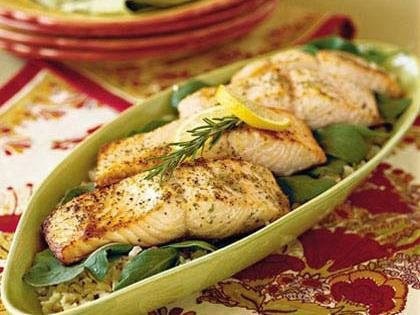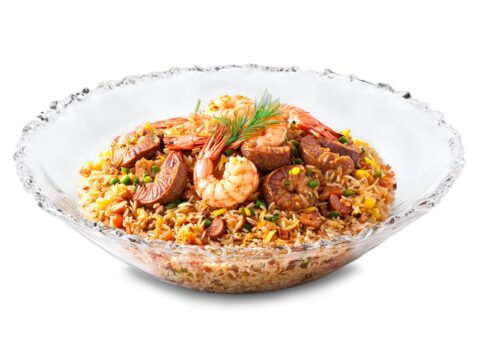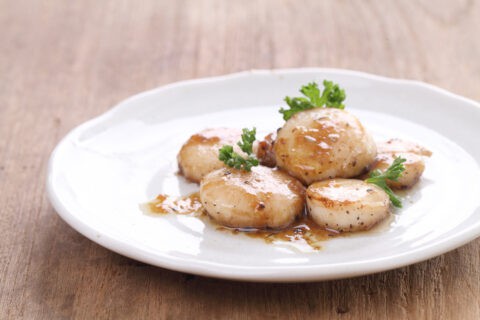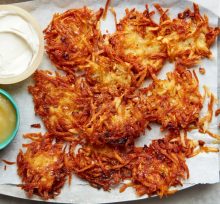
Salmon fits into the Mediterranean diet perfectly and offers specific health benefits you won’t get from just any type of fish.
Updated July 18th 2023
The Pesco-Mediterranean Diet Is The Perfect Match For Extra Virgin Olive Oil
Switching to a plant-based diet is an increasingly popular choice and The Mediterranean Diet remains one of the key choices for a healthier lifestyle. If going completely meat free feels too extreme for you, the Pesco-Mediterranean Diet could be a great compromise. But what does it consist of and why might it be a good choice for your new year health resolutions?
The Pesco-Mediterranean diet is “Essentially the Mediterranean diet combined with fish and seafood as your main animal food sources.”
According to The Mayo Clinic, The Mediterranean diet (made mostly of plant-based foods, with olive oil being the primary source of added fat) is based on the traditional cuisines of Greece, Italy and other countries bordering the Mediterranean Sea.
A typical Mediterranean diet pattern entails the following key aspects, according to the Mayo Clinic:
- Forms meals around vegetables, beans and whole grains.
- Eat fish at least twice a week.
- Use olive oil instead of butter when cooking.
- Serve fresh fruit for dessert.
The foundation of a Pesco-Mediterranean diet usually consists of vegetables, fruits, nuts, seeds, legumes, whole grains, as well as extra-virgin olive oil, fish, seafood and fermented dairy products.
What Are The Pesco-Mediterranean Diet Health Benefits?
Speaking to Newsweek, Katherine Zeratsky, a registered dietitian nutritionist (RDN) at the Mayo Clinic, said the Pesco-Mediterranean diet “follows the positive trend of the benefits of the traditional Mediterranean diet.”
And the first health benefit is great news for lovers of Extra Virgin Olive Oil!, it’s a great source of healthy fats including extra virgin olive oil
Nuts and seeds also form a regular part of a Pesco-Mediterranean diet. Not only are they both an excellent source of healthy fats, they’re also rich in dietary fiber and provide a lean source of protein, Ehsani noted.
According to the 2020 JACC study, trial groups that consumed a Mediterranean diet supplemented with nuts or extra virgin olive oil had “statistically significant reductions of 29 percent for major adverse CVD [cardiovascular disease] events—myocardial infarction (MI), stroke, and death from these causes—and 42 percent for stroke,” compared with groups on a simple low-fat diet.
Salmon, Lemon and Olive Oil Recipe
Ingredients
- 4 (6-ounce) salmon fillets
- 1/2 teaspoon salt
- 1/2 teaspoon coarsely ground pepper
- 1 teaspoon grated lemon rind
- 3 tablespoons fresh lemon juice, divided
- 2 tablespoons extra-virgin olive oil, divided
- 1 teaspoon fresh or dried rosemary
- Vegetable cooking spray
- 2 cups hot cooked brown rice
- 4 cups arugula or uncooked baby spinach
- Garnishes: lemon slices, rosemary sprigs
Instructions
- Sprinkle salmon fillets evenly with salt and pepper.
- Place fillets, lemon rind, 1 tablespoon lemon juice, 1 tablespoon extra virgin olive oil, and rosemary in a large zip-top plastic bag. Seal and turn to coat. Chill 30 minutes
- Remove fillets from marinade, discarding marinade. Place fillets, skin side down, on a rack coated with cooking spray in an aluminum foil-lined broiler pan.
- Broil fish 5 1/2 inches from heat 10 to 12 minutes or until fillets flake easily with a fork.
- Arrange rice and arugula on a serving platter; top with fillets.
- Whisk together remaining 2 tablespoons lemon juice and 1 tablespoon extra virgin olive oil; drizzle evenly over fillets. Garnish, if desired.
- Share the wonderful Broiled Salmon
The Importance Of Fish In The Mediterranean Diet
The Mediterranean diet is a way of eating that focuses on whole foods and a plentiful amount of good fats. This includes fruits, vegetables and whole grains daily, while including fish, low-fat dairy, eggs and poultry in your meals just a few times per week.
Fish and seafood should be your primary sources of protein on the Mediterranean diet. You can have fish at least two times a week. Salmon is a particularly beneficial type of fish because not only is it high in monounsaturated and polyunsaturated fats, but it’s also rich in omega-3 fatty acids. Omega-3s are a type of polyunsaturated fat that reduce inflammation throughout your body. They can help reduce your blood pressure, improve your cholesterol levels, reduce your risk of blood clots, make your immune system work better and protect your heart. For optimal health, you should aim for 800 to 1,000 milligrams of omega-3 fatty acids each day, states the University of Massachusetts Medical School. Just three ounces of salmon provide as much as 1,500 milligrams of omega-3s.
Salmon : A perfect Match For Morocco Gold Extra Virgin Olive Oil
Salmon, originally, the large fish now usually called the Atlantic salmon (Salmo salar), though more recently the name has been applied to similar fishes of the same family (Salmonidae), especially the Pacific salmon, which constitute the genus Oncorhynchus.
The six species of Pacific salmon (Oncorhynchus) are the following: the sockeye or red salmon (O. nerka), which ranges from the northern Bering Sea to Japan and the Columbia River of the American Northwest; the coho or silver salmon (O. kisutch), ranging from the Bering Sea to Japan and the Salinas River of Monterey Bay; the chum or dog salmon (O. keta), ranging from the Mackenzie and Lena rivers in the southern Arctic southward to Japan and the Rogue River; the king, spring, or chinook salmon (O. tshawytscha), from the Yukon River to China and the Sacramento River; the pink or humpback salmon (O. gorbuscha), from the Arctic to Japan and the Klamath River; and the cherry salmon (O. masu), which is found off Japan. The Atlantic salmon is native to the rivers on both sides of the North Atlantic. The adult Atlantic salmon averages about 10 pounds (4.5 kg) in weight, while the king salmon averages about 23 pounds (10 kg), though individuals of 50–80 pounds (22–36 kg) are not uncommon. Chum salmon average about 10–12 pounds (4.5–5.5 kg); coho salmon weigh about 7–10 pounds (3–4.5 kg); sockeye, about 4–7 pounds (2–3 kg); and pink salmon, 3–6 pounds (1.3–2.7 kg).
Nutritional Information
Fish and shellfish are nutrient dense and salmon is no exception. It is rich in a protective antioxidant, astaxanthin, and it is an excellent source of high-quality protein, vitamins and minerals (including potassium, selenium and vitamin B12). However, it is the content of omega-3 fatty acids in salmon that receives the most attention, and rightly so. It is this essential fat which is responsible for the reputation of oily fish as a valuable ‘brain food’.
Omega-3 Fatty Acids
The most beneficial omega-3 fats occur naturally in oily fish in the form of eicosapentaenoic acid (EPA) and docosahexaenoic acid (DHA). These fatty acids are thought to contribute to healthy brain function, the heart, joints and general well-being. The idea that eating fish may reduce the risk of heart disease began in the 1970s and 1980s when it was noted that among the Inuits in Arctic Greenland (where high consumption of marine animals was the normal diet), heart disease was very low. In addition to heart disease, scientists are now investigating the role that fish consumption may have in protecting us against some cancers as well as many chronic diseases including Alzheimer’s disease , asthma, depression, diabetes, high blood pressure, macular degeneration, multiple sclerosis and rheumatoid arthritis.
Omega-3 is termed as an essential fatty acid because the body cannot synthesise it, so it must be obtained from the diet. To optimise your body’s supply of essential fats rich in EPA and DHA, aim to eat oily fish such as salmon, mackerel, sardines, herring and fresh tuna regularly. The Department of Health guidelines state that we should aim to eat fish at least twice a week with at least one portion being an oily variety, like salmon. For pregnant and breastfeeding women there is specific guidance. EPA and DHA are important for your baby’s developing central nervous system, including the brain, so they make a valuable contribution to a healthy balanced diet during pregnancy, but follow do the NHS advice with regards to quantities.
Broiled Salmon With lemon & Extra Virgin Olive Oil
Salmon is a delicious and nutritious fish that is packed with protein, omega-3 fatty acids, and a variety of vitamins and minerals. When paired with extra virgin olive oil, salmon makes for a heart healthy recipe that can help to improve cholesterol levels and reduce the risk of heart disease. Extra virgin olive oil is made from the first cold pressing of olives and contains higher levels of antioxidants known as polyphenols.
These polyphenols provide numerous health benefits, including reducing inflammation, lowering blood pressure, and protecting against heart disease. Extra virgin olive oil is also the best olive oil to use for cooking as it has a higher smoke point than other types of olive oil. This means that it can be heated to a higher temperature without smoking or burning, making it ideal for cooking salmon. When looking for a quality extra virgin olive oil, be sure to look for one that is cold-pressed and unrefined like Morocco Gold. With its myriad of health benefits, Morocco Gold extra virgin olive oil is the perfect addition to any heart healthy recipe.
Broiled salmon is a delicious and healthy option for a heart-healthy recipe. The extra virgin olive oil provides numerous health benefits, including reducing the risk of heart disease and stroke. The best olive oil to use for this purpose is extra virgin olive oil like Morocco Gold, which contains high levels of polyphenols. These molecules have been shown to reduce inflammation and improve cardiovascular health. In addition, extra virgin olive oil can help to lower cholesterol levels and improve blood sugar control. As a result, it is an excellent choice for this heart-healthy recipe.
This dish is a highly nutritious choice that has a wonderful citrus flavor from the lemon. Monounsaturated fat from the extra virgin olive oil, Omega-3 fatty acids from salmon, and fiber from brown rice make for a wonderfully heart healthy recipe.
Source: BBC Food Guide
Important Disclaimer
The information provided on this website is for general informational purposes only. All content, including text, graphics, images, and information, is presented as an educational resource and is not intended as a substitute for professional medical advice, diagnosis, or treatment.
Please consult with a qualified healthcare provider before making any decisions or taking any action based on the information you find on this Website. Do not disregard, avoid, or delay obtaining medical or health-related advice from your healthcare provider because of something you have read on this Website.
If you think you may have a medical emergency, call your doctor, go to the nearest emergency department, or call emergency services immediately. We are not responsible for any adverse effects resulting from your use of or reliance on any information or content on this Website.
By using this Website, you acknowledge and agree to this disclaimer in full.



